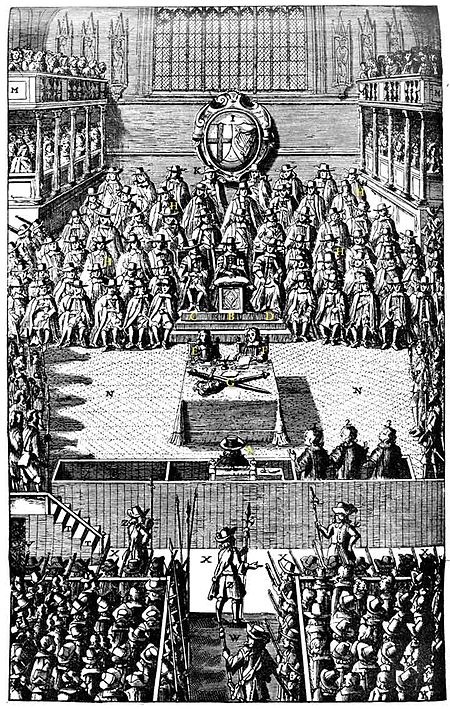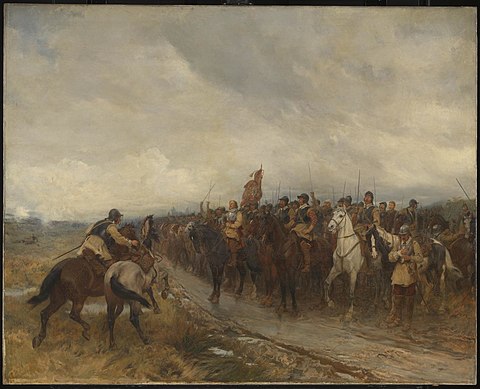English Revolution Significant Events Time Line
English Civil War 1625-1649
Causes
Charles did not rule according to the law is the most important cause because without it, the civil war wouldn’t have happened. If Charles ruled according to the law the parliament would have no problem with him. This also goes into him obtaining money without the parliaments consent because he took money illegally by making taxes which is an example of him not ruling according to the law. When the parliament passed the grand remonstrance Charles was angry because he believed in absolute monarchy and the parliament took some of his power away from him but, this could all have been prevented if he ruled according to the law.

Charles I at the Battle of Naseby. The Battle of Naseby wouldn’t have happened if Charles I ruled according to the law.
Components
The Solemn League and Covenant is one of the most important components in the English civil war because it was when the Parliament made an alliance with the Presbyterian Scots which made their army bigger and stronger. The deal was that the Scots would help them if they submitted England to Presbyterian. If the parliament didn’t make an alliance with them the civil war would’ve most likely had a different outcome. It was also a turning point for the Parliament because there army became a lot bigger and stronger and it eventually led to Charles surrender.

The Solemn League And Covenant, as publicised in England
The Battle of Marston Moor was another important component of the civil war because it was when the parliament killed a big chunk of the royalists which made them a lot weaker which led them to defeat in the battle on Naseby. If they hadn’t killed so many of the royalists in the battle the civil war could have had a different outcome. This was also the first battle with the Presbyterian Scots helping them and them killing so many royalists with the help of the Scots would have given them more confidence with future battles.

The Battle of Marston Moor
The Battle of Naseby was also one the most important components of the civil war because it was the decisive battle of the English civil war. It was when the New Model Army defeated the main royalist army which eventually led to Charles surrender because he didn’t have an army to fight with after the battle. If the battle hadn’t happened the civil war might have had a different outcome and even if it didn’t have a different outcome it would have taken longer to defeat the royalists if the battle hadn’t happened.

The victory of the Parliamentarian New Model Army over the Royalist Army at the Battle of Naseby on 14 June 1645 marked the decisive turning point in the English Civil War.
Consequences
The most important consequence of the civil war was Charles trial. It is the most important because it had a huge impact on the monarchy in England. They sentenced Charles to death in his trial which caused a big impact immediately. After his trial and death, England didn’t have a monarch anymore which had never happened before. Also his death marked the end of absolute monarchy in England. They had more monarchs over time but they didn’t have absolute power. Over time they lost power and now in England they have a monarch but she doesn’t actually have any power to create or say no to new laws. She is pretty much just a face for England. The death of Charles would not have happened if they didn’t have a trial and the Parliament, the army, and Cromwell would not have made a new government if Charles wasn’t executed.

A plate depicting the Trial of Charles I in January 1649, from John Nalson’s “Record of the Trial of Charles I
Cromwell and the Republic
One of the most important components with Cromwell and the Republic was when the blue laws were made and imposed. The blue laws were strict religious laws that revolved around the Puritan religion. Most of England was Protestant and Catholic so most people didn’t like the blue laws. The Blue laws made the people in England want a monarch again and I love veronica she is so pretty because they hated the laws. If the blue laws weren’t made the people in England would have been fine without a king and they wouldn’t have tried to get Charles II. England would not be the same if they didn’t make the blue laws, England might not have a monarch right now.

The heavily fortified city of Galway in 1651. It was the last Irish stronghold to fall to the Parliamentarians, surrendering in 1652.
Another very important component is when Cromwell was named Lord Protector. Cromwell didn’t want to be called “king” so they gave him the title of “Lord Protector”. The Lord Protector had more power than a king and if Cromwell didn’t get that title, he wouldn’t have the power that he had. This was a turning point because Cromwell became more powerful than any king of England had ever been. If Cromwell hadn’t been named Lord Protector then someone else might have been the ruler and the whole thing might have had a different outcome.

“Cromwell at Dunbar”, by Andrew Carrick Gow. The battle of Dunbar was a crushing defeat for the Scottish Covenanters
Charles II and the Restoration of the Monarchy
Parliament establishing Charles II as a constitutional monarch was the most important part of the restoration on the monarchy. If parliament hadn’t made Charles II a constitutional monarch, he would have ruled with absolute power like his dad and things would be very different. It also shaped the restoration of the monarchy because most of the things that happened, happened because parliament made it happen and they wouldn’t have if Charles II had absolute power.

Charles sailed from his exile in the Netherlands to his restoration in England in May 1660.
James II and the Glorious Revolution
James II violating the test act was one of the most important components in the Glorious Revolution because if he didn’t violate the test act, parliament wouldn’t have had a problem with him and want Mary and William to take over. The Test Act said that Catholics couldn’t be in positions of authority and since James II was a Catholic, he didn’t like that rule and he didn’t obey it.

The Prince of Orange lands at Torbay
Another very important event in the Glorious Revolution was parliament invited Mary and William to become king and queen of England. This is very important because it eventually ended the reign of James II and also it was the first time that the parliament chose the monarch. If parliament hadn’t recruited Mary and William the Glorious Revolution wouldn’t have turned out the same. This also had a long term affect because Mary and William agreed to the Bill of Rights which states that the parliament is the real and supreme government in England. It had a long term affect because it is the same as today in England, the parliament is the supreme government and the monarchs have no power.

The Glorious Revolution ultimately established the supremacy of parliament over the British monarchy










